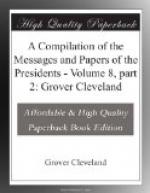In the course of this communication reference has more than once been made to the policy of this Government as regards the extension of our foreign trade. It seems proper to declare the general principles that should, in my opinion, underlie our national efforts in this direction.
The main conditions of the problem may be thus stated:
We are a people apt in mechanical pursuits and fertile in invention. We cover a vast extent of territory rich in agricultural products and in nearly all the raw materials necessary for successful manufacture. We have a system of productive establishments more than sufficient to supply our own demands. The wages of labor are nowhere else so great. The scale of living of our artisan classes is such as tends to secure their personal comfort and the development of those higher moral and intellectual qualities that go to the making of good citizens. Our system of tax and tariff legislation is yielding a revenue which is in excess of the present needs of the Government.
These are the elements from which it is sought to devise a scheme by which, without unfavorably changing the condition of the workingman, our merchant marine shall be raised from its enfeebled condition and new markets provided for the sale beyond our borders of the manifold fruits of our industrial enterprises.
The problem is complex and can be solved by no single measure of innovation or reform.
The countries of the American continent and the adjacent islands are for the United States the natural marts of supply and demand. It is from them that we should obtain what we do not produce or do not produce in sufficiency, and it is to them that the surplus productions of our fields, our mills, and our workshops should flow, under conditions that will equalize or favor them in comparison with foreign competition.
Four paths of policy seem to point to this end:
First. A series of reciprocal commercial treaties with the countries of America which shall foster between us and them an unhampered movement of trade. The conditions of these treaties should be the free admission of such merchandise as this country does not produce, in return for the admission free or under a favored scheme of duties of our own products, the benefits of such exchange to apply only to goods carried under the flag of the parties to the contract; the removal on both sides from the vessels so privileged of all tonnage dues and national imposts, so that those vessels may ply unhindered between our ports and those of the other contracting parties, though without infringing on the reserved home coasting trade; the removal or reduction of burdens on the exported products of those countries coming within the benefits of the treaties, and the avoidance of the technical restrictions and penalties by which our intercourse with those countries is at present hampered.
Secondly. The establishment of the consular service of the United States on a salaried footing, thus permitting the relinquishment of consular fees not only as respects vessels under the national flag, but also as respects vessels of the treaty nations carrying goods entitled to the benefits of the treaties.




